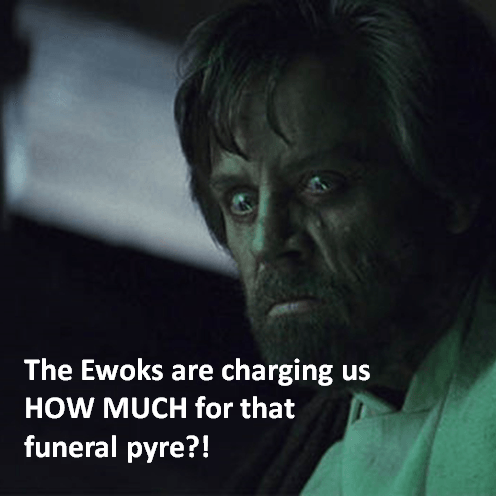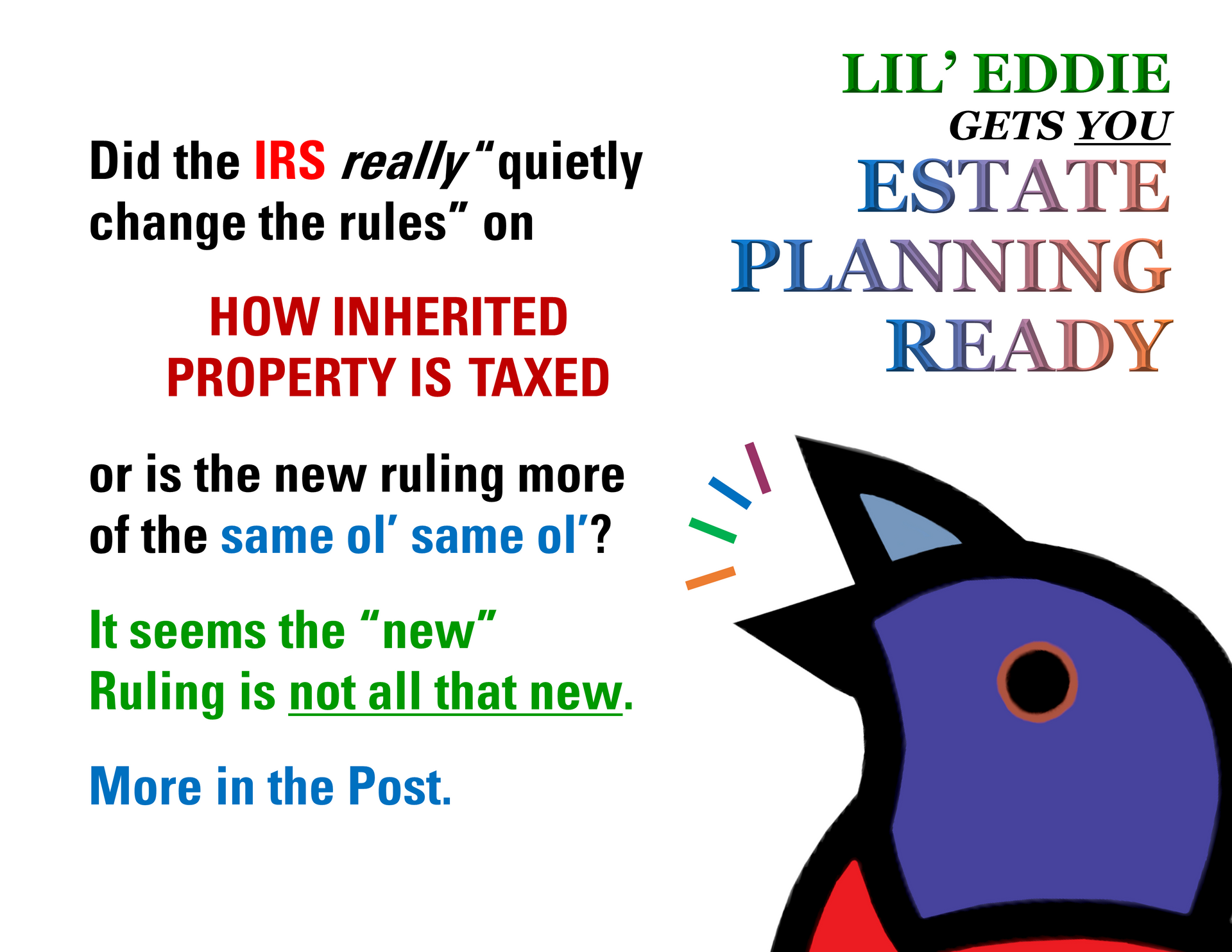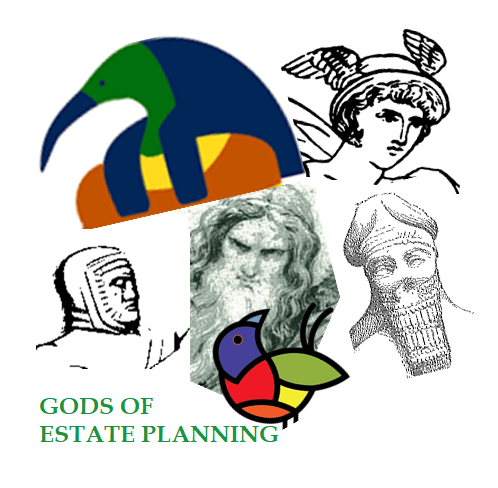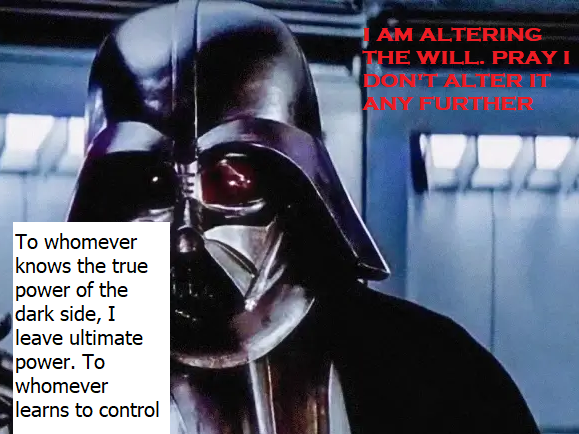The Estate of Darth Vader: Episode III – The Intestate Menace
How is the estate distributed if you don't have a will?
Train yourself to let go of everything you fear to lose. Sure, that’s great advice for a monastic peacekeeping order of sorcerers long ago in a galaxy far, far away, but most want to ensure their assets pass to whom they want. This includes Darth Vader, who decided, at the very last minute of his life, that he wanted his worldly possessions to pass to his twin children. Of course, he didn’t even know he had a second child until the day he died. We’ll assume that, if Darth Vader even did have a will, he revoked it by obliterating it (the statutory terminology) while being dragged by Luke to the hangar bay. How then will Darth Vader’s assets pass if he had no will or living trust?

Joint Tenancy
Joint tenancy is a form of asset ownership in which an asset is held equally by all owners and passes automatically at the death of one of the owners to the remaining owners. Some people chose this type of property ownership to help avoid the probate process at the first owner’s death, but it’s just kicking the can down the road to the next owner’s death and probate.
We’ll often hear people repeat the dubious advice to “just name your kids on the property as joint tenants with you, and it’ll avoid probate when it goes to them.” It’s a trap! Kids get sued? It’s their property. Kids decide they want the asset to be used differently? It’s their property! Worried about paying extra taxes? If you gift real estate to a child during your life by naming them a joint tenant, sure there’s a gift tax issue, but more importantly are the capital gains tax issues.
Suppose Luke and Leia inherit Fortress Vader, worth $500,000 at Darth Vader’s death. When he bought Fortress Vader it was worth $100,000. Since he died with it entirely in his name, Luke and Leia can sell the property for $500,000 and pay no capital gains tax, because the property received a step-up in basis at Darth Vader’s death. If, however, Darth Vader named Luke and Leia as joint tenants on the property during his life, there’d be no step-up in basis and capital gains would be determined based on the original $100,000 value: a $400,000 capital gain. This means a $60,000 tax for Luke and Leia if they're taxed at the 15% rate!
Darth Vader owned no assets jointly. He was a solitary man, and his property ownership reflected that. None of his assets will pass to surviving joint owners. Perhaps for the best, because Luke and Leia can now benefit from that wonderful step-up in basis.
Beneficiary Designations
Many accounts allow owners to name a beneficiary. These are sometimes called payable on death (POD) or transfer on death (TOD) accounts. These designations automatically transfer the account when the owner dies. The institution or bank transfers ownership as part of its internal process without going through probate. Vehicles registered in Connecticut may also have a beneficiary designated. On the reverse side of the registration certificate, or on a separate Beneficiary 1 certificate, you may name a beneficiary to receive the vehicle after your death.
What if the will or the trust says something different from the account’s beneficiary designations? The account would still be transferred to the account’s beneficiaries, not the will’s or trust’s beneficiaries.
Did
Darth Vader designate beneficiaries for his various accounts? Perhaps. What if he named his master, Darth Sidious, as the beneficiary? Darth Sidious is famously dead (or so we think), and the bank or institution will look to see if a contingent beneficiary was named should the primary beneficiary predecease the owner.
Intestacy
Assets in the estate which aren’t passed through joint tenancy or beneficiary designations will instead pass through the probate process. If the deceased had a will, the probate court would dispose of the estate according to the terms of the will. If there isn’t a will, the court will instead refer to the state’s intestacy laws to determine who gets what. An estate is “intestate” when there isn’t a will guiding the disposition of the estate. Who gets what under intestacy depends on whether the deceased had (1) a living spouse, (2) living descendants, and (3) living siblings.
In Connecticut, if the deceased was married and had children only by their surviving spouse, the spouse inherits the first $100,000 in the intestate estate and the remainder is split half to the spouse, and the other half to the deceased’s children. If one of the children was not the surviving spouse’s, it’s an even split between spouse and children. If there were no descendants and no parents, the spouse gets everything. If there was no spouse, the children get everything.
What if there were no living spouse, descendants, or siblings? The siblings’ descendants would be next. What if they had no descendants? Now we’re in “next of kin” territory where very remote relatives could inherit. No next of kin? The deceased’s stepchildren now enter the picture as inheritors. No stepchildren? The estate finally “escheats” and is transferred to the state.
Darth Vader
had no living spouse and was survived by two children. The probate court will therefore distribute the intestate estate to Luke and Leia equally. It was fortunate that the intestacy laws matched what Darth Vader wanted. The circle is now complete, at least it will be once the probate process is concluded. Mind what you have learned. Save you it can.
What if Darth Vader had actually created a meaningful estate plan? What if his predeceased wife, Padmé Amidala, created a trust for the benefit of her children, Luke and Leia? Find out more in our next installment: The Estate of Darth Vader: Episode IV – The Inheritance of Luke and Leia.

Quick Links
Services
Get in Touch
Phone: 203-951-5435
Address: 1480 Boston Post Rd, Old Saybrook, CT 06475, United States of America
All Rights Reserved | Ed Lowe Law, LLC




